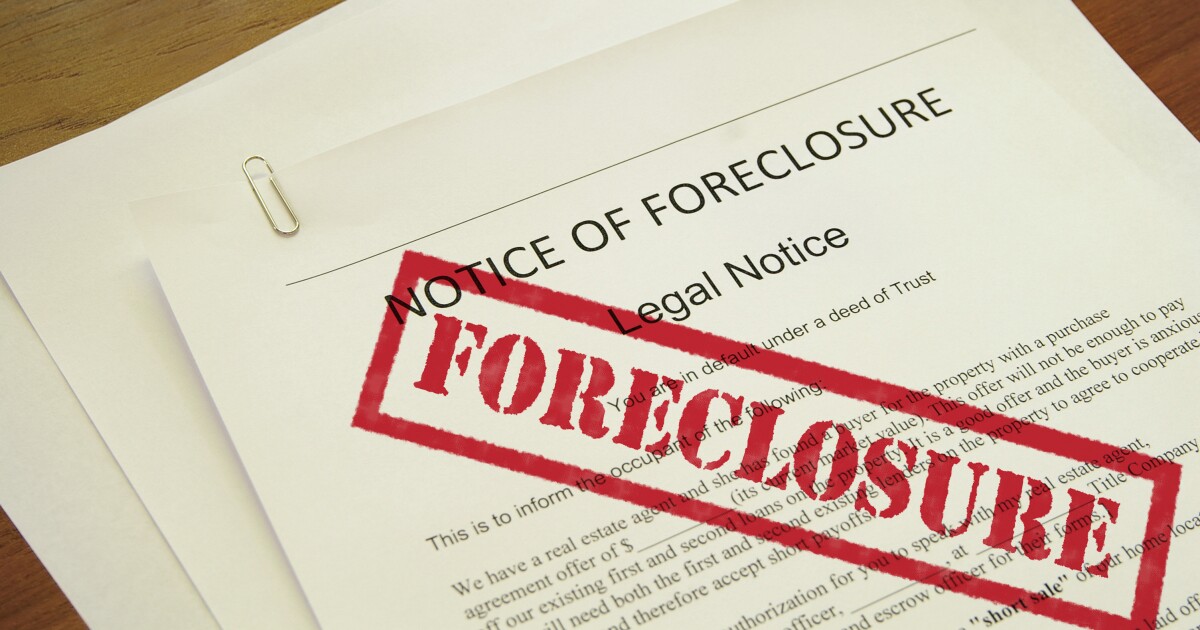
Foreclosure activity was up in October compared with September, a possible warning sign of troubles on the horizon, according to Attom Data Solutions.
The number of properties with a foreclosure filing increased by 4% from September, while starts headed 6% higher and completed repossessions were up by 12%.
The environment "remains challenging," Attom CEO Rob Barber said.
"As we approach 2025,
Traditionally
For October, one in every 4,578 housing units had a foreclosure filing in place, led by Nevada (one in every 2,741); New Jersey (one in every 3,059); Florida (one in every 3,086); California (one in every 3,152); and South Carolina (one in every 3,272).
For the month, servicers initiated 20,950 foreclosure actions. A trio of states accounted for about 35% of the total: California at 2,915; Texas, 2,282; and Florida, 2,227.
When it comes to real estate owned, lenders repossessed 2,938 properties through completed foreclosures during October.
Compared with October 2023, the number of properties with some sort of foreclosure filing was 11% lower, while starts were down by 10% and completed foreclosures, 12% lower.
Another bit of data hinting at future growth in foreclosures came from Transunion, which showed the 60-day-or-more delinquency rate in the third quarter rising year-over-year.The latest data put the rate at 1.31%, up 29 basis points over the third quarter of 2023. That followed a 13 basis point gain in 2023 compared with the third quarter of 2022 and a 9 basis point rise for 2022 over 2021.
"The year-over-year increase in delinquencies is certainly something worth monitoring," said Satyan Merchant, senior vice president, automotive and mortgage business leader at Transunion, in a press release. "However, it's important to note that current delinquency rates remain low in comparison to long-term measures."
But it remains to be seen if the Federal Reserve's interest rate cuts of 75 basis points at its last two meetings — and an anticipated 25 basis point reduction in December — along with heretofore
The report looks at other forms of debt and noted the annual pace of increased delinquencies slowed for credit card and auto loans. For personal loans, late payment rates declined versus the third quarter of 2023.
A separate survey from personal finance company Achieve and its Center for Consumer Insights found 36% will have trouble paying their recurring debts on time in the fourth quarter, unchanged from the third quarter.
While that is unchanged from the third quarter, 68% said paying their debts on time is a challenge because they don't make enough money to cover their spending, up from 64% one quarter ago.
"Across the board,
"More than a quarter of Americans are seeing their amount of debt increase and a majority don't have enough money to cover their spending month to month."
But what might favor mortgage servicers is that the highest percentage of respondents, 38%, said they were likely to miss or be late on a student loan payment in the next three months, followed by 18% for a personal loan. Just 9% said they were likely to default on their mortgage.
The mortgage percentage is flat with the third quarter but up from 8% in the second quarter.
Going forward, 40% of the consumers surveyed expect their overall financial situation to improve in the second quarter of 2025. The share is down from 57% of second quarter respondents, who said they expect to see an improvement at the same period of time.



